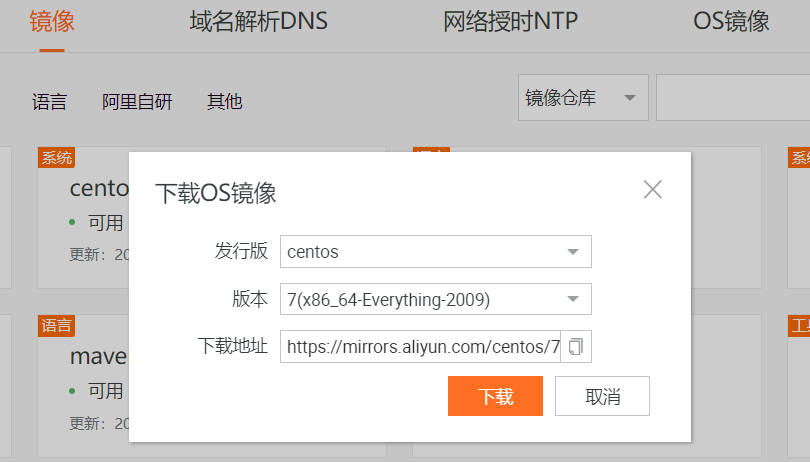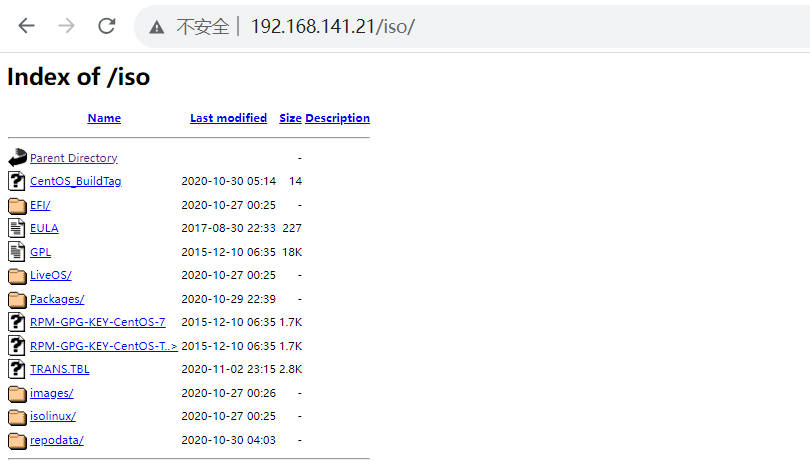在项目开发部署过程中,一般都是内网环境,无法在线安装一些软件,这时候就需要我们配置离线的yum源。
centos版本:7.9.2009
制作yum源
一般会选择从阿里云:https://developer.aliyun.com/mirror/ 下载,速度比较快,资源也比较丰富,建议下载everything,虽然文件比较大。

也可以自行下载rpm包,然后上传到centos服务器,比如/data/rpm目录下,进入存放目录,执行以下命令:
这样,rpm包存放的目录就可以作为yum源目录使用了,也可以将这个目录打包后,放到其他地方使用。
安装yum源
使用iso文件制作yum源,需要先挂载
1
2
3
4
| mkdir -p /data/iso # 创建挂载目录
cd /data # 假设文件上传到/data目录下
mount -o loop -t iso9660 CentOS-7-x86_64-Everything-2009.iso /data/iso # 可以添加到/etc/rc.local中,避免重启失效
|
添加repo配置文件,并将之前的repo备份
1
2
3
4
| cd /etc/yum.repos.d/
mkdir bak
mv *repo bak/
vim local.repo
|
至于local.repo中的内容则如下
1
2
3
4
5
| [iso]
name=CentOS-7-x86_64-Everything-2009-iso
baseurl=file:///data/iso
gpgcheck=0
enabled=1
|
最后刷新一下yum缓存
1
2
| yum clean all
yum makecache
|
如果是自行制作的yum源,则直接解压,并配置.repo文件即可
共享yum源
完成以上步骤,只能在本地使用离线yum仓库,如果希望局域网内的其他服务器也能使用该yum仓库,则需要通过http服务或者是ftp服务将yum仓库共享出去,这里以http方式进行示例
1
2
3
| yum install -y httpd
systemctl enable httpd
systemctl start httpd
|
如果无法通过yum方式安装,请依次下载以下包进行安装(centos7.0系统为例)
1
2
3
4
5
6
7
8
| rpm -ivh apr-1.4.8-3.el7.x86_64.rpm
rpm -ivh apr-util-1.5.2-6.el7.x86_64.rpm
rpm -ivh httpd-tools-2.4.6-31.el7.x86_64.rpm
rpm -ivh mailcap-2.1.41-2.el7.noarch.rpm
rpm -ivh httpd-2.4.6-31.el7.x86_64.rpm
systemctl enable httpd
systemctl start httpd
|
httpd服务默认的端口是80,默认的资源路径是/var/www/html/,因此可以将/data/iso目录做个软连接到这个目录下:
1
| ln -s /data/iso /var/www/html/iso
|
然后就可以直接访问了

这样如果想在其它服务上使用该仓库,添加一下配置就可以了
1
2
3
4
5
| [http_iso]
name=http_repo
baseurl=http://192.168.141.21/iso
gpgcheck=0
enabled=1
|
FAQ
ssh服务设置
vim /etc/ssh/sshd_config
1
2
3
4
5
6
7
8
| PermitRootLogin yes
PasswordAuthentication yes ## 允许root远程密码登录
GSSAPIAuthentication no
UseDNS no ## 解决ssh登录慢问题
ClientAliveInterval 600
ClientAliveCountMax 10 ## 修改ssh空闲时间,每隔600秒尝试连接一下客户端,尝试10次失败后断开连接
|
服务信息获取
1
2
3
4
5
6
7
8
9
10
11
12
13
14
| function version_of_os(){
if [ -f "/etc/redhat-release" ]; then
cat /etc/redhat-release | grep -oE '[0-9]+\.[0-9\.]+';
elif [ -f "/etc/kylin-release" ]; then
cat /etc/kylin-release | grep -oE 'V[0-9]+';
elif [ -f "/etc/os-release" ]; then
cat /etc/os-release | grep VERSION= | grep -oE '[0-9]+\.[0-9\.]+';
else
echo "unkown version of os";
exit 1;
fi
}
os_version=$(version_of_os)
|
1
2
3
4
5
6
7
8
9
10
11
12
13
14
| function name_of_os(){
if [ -f "/etc/redhat-release" ]; then
cat /etc/redhat-release | awk '{print $1}';
elif [ -f "/etc/kylin-release" ]; then
cat /etc/kylin-release | awk '{print $1}';
elif [ -f "/etc/os-release" ]; then
cat /etc/os-release | grep -E "^ID=" | awk -F'=' '{print $2}' | sed 's/\"//g'
else
echo "unkown name of os";
exit 1;
fi
}
os_name=$(name_of_os)
|
参考:
- https://blog.csdn.net/sinat_32724581/article/details/110119231
- https://blog.csdn.net/huangjin0507/article/details/51351807

